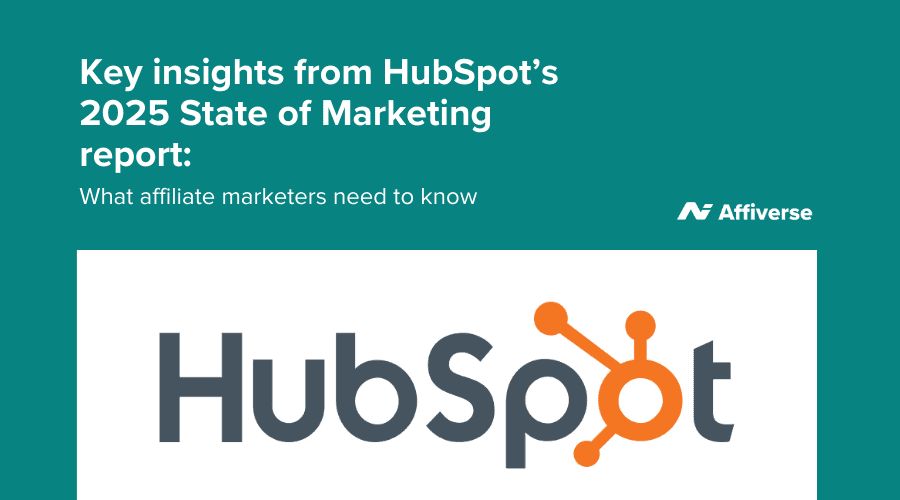Key insights from HubSpot’s 2025 State of Marketing report: What affiliate marketers need to know

The digital marketing landscape is always changing, and HubSpot’s 2025 State of Marketing Report provides a comprehensive look at the key trends that are proving to shape the industry. Thanks to AI, changing consumer expectations, and the ever-growing popularity of short-form video, marketers must be willing to adapt if they want to stay ahead—and relevant.
Affiliate marketers especially should pay close attention to these insights, as they offer a clear roadmap to refine content strategies, improve audience engagement, and find new ways of leveraging technology to increase RIOs.
Today, we’ll look at some of the key takeaways from the report, and how affiliate professionals can apply them effectively.
Read the full report here: HubSpot 2025 State of Marketing
AI is reshaping content creation and campaign execution
Artificial intelligence has been headline news for almost three years now, and, according to HubSpot’s report, it’s also playing a core part of marketing success. The report reveals that marketers are integrating AI in a number of ways, with the most prominent being:
- Content creation (35%)
- Data analysis and insights (30%)
- Workflow automation (20%)
For affiliate marketers, AI-powered content creation tools changed the game significantly—especially for those who don’t rely on organic SEO for traffic. Marketers have been using AI to write blogs, ad copy, and social media posts. AI-driven analytics are also being utilised, giving affiliates clearer overviews on how their campaigns perform, so they can fine-tune them accordingly.
Hint: While AI can be a powerful tool for content creation, don’t rely on it entirely. Marketers should always ensure content contains a human touch—vital both to maintain authenticity, and to prevent penalisations from Google.
Short-form video is the king of engagement
The report also showed the continued rise of short-form video, with platforms like TikTok, Instagram Reels, and YouTube Shorts delivering the highest ROI across marketing channels, particularly among Millennial and Gen Z audiences.
Affiliate marketing is all about high engagement and trust—and this makes short-form video an invaluable tool. Consumers are far more likely to engage with content that’s authentic, visually compelling, and trustworthy—especially if it includes influence collaborations or real-time product demos.
Affiliate marketers can consider incorporation short-form video into their campaigns by:
- Creating quick product reviews, tutorials, or testimonials
- Partnering with micro-influencers for added credibility
- Testing platform-specific features like TikTok Shop or Instagram Reels ads
Gen Z and Millennials are shaping the future of marketing
Interestingly, HubSpot’s data also shows marketing teams are focusing heavily on younger demographics, particularly Millennials and Gen Z. These groups have shown themselves to actively prefer—and seek out— authenticity, social proof, and personalised experiences, especially when compared to traditional advertising.
To adapt, affiliate marketers should:
- Prioritise community-driven marketing through social media groups, user-generated content, and influencer partnerships
- Leverage social spending by optimising brand awareness on Instagram Shops, TikTok Shop, and Pinterest
- Use email segmentation and AI-powered recommendations to tailor affiliate offers to different audience segments
Rather than hard selling, affiliate marketers should focus on storytelling, social engagement, and value-driven content when selling to younger demographics.
Data-driven marketing is non-negotiable
With AI improving data analysis capabilities, marketing success in 2025 is rooted in performance tracking and optimisation. Affiliate marketers who fail to monitor and adjust their campaigns risk falling behind.
The report highlighted a number of valuable trends. For example, AI-powered data analytics tools can be used to uncover trends, identify high-performing content, and even improve targeting.
The report also showed that marketers are increasingly using A/B testing, predictive analytics, and automated reporting to help them refine their strategies.
To utilise these revelations, affiliate marketers should:
- Track metrics beyond clicks and conversions, such as engagement rates, retention, and customer lifetime value
- Use AI-driven insights to refine campaigns in real time by adjusting targeting, tweaking creatives, and optimising landing pages dynamically
- Build email lists and leverage CRM tools to strengthen direct relationships with audiences
The takeaway: AI-first, audience-focused, and flexible marketing
HubSpot’s 2025 State of Marketing Report shows a clear underlying theme: marketers who embrace AI, focus on creating authentic content, and leverage data-driven insights are suceeding—and will likely have a significant competitive advantage over those not staying up to date.
This means, in short:
- Using AI to scale content creation and data analysis
- Leveraging short-form video for higher engagement and conversions
- Focusing on Millennial and Gen Z audiences with authentic, community-driven strategies
- Making data a central pillar of campaign optimisation
As AI continues to evolve, marketers must find ways to balance automation with human “touches” and creativity to help them build sustainable, high-performing affiliate campaigns!
Read HubSpot’s full report here: HubSpot 2025 State of Marketing Report






